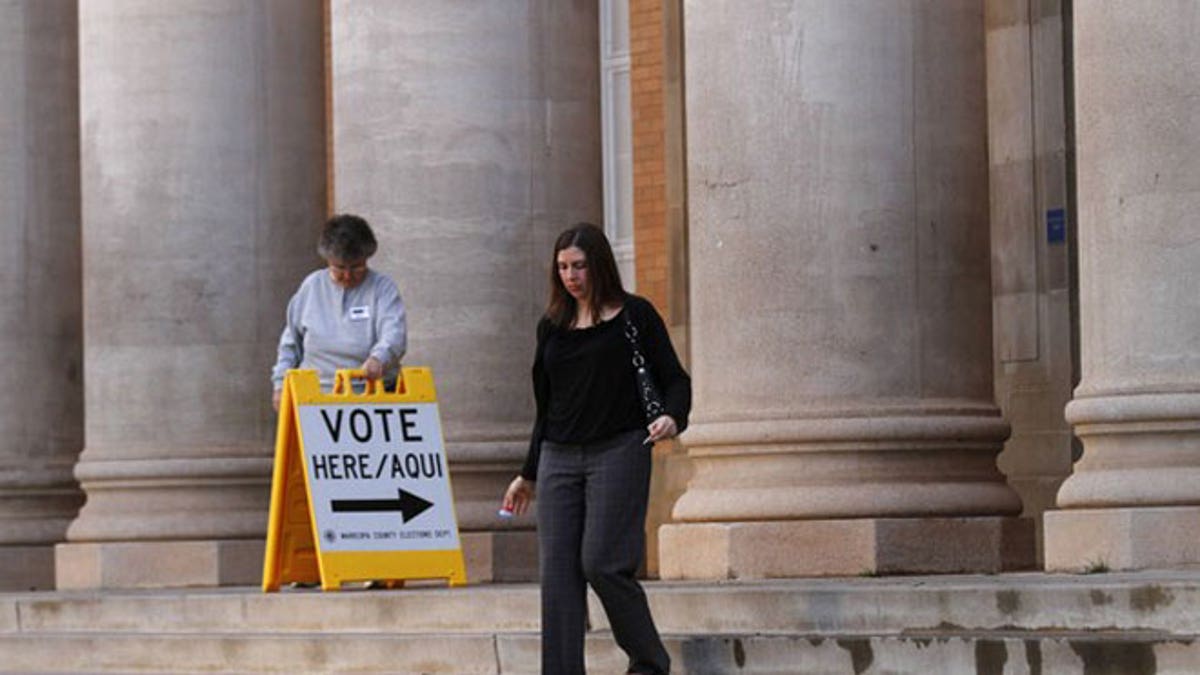
February 28, 2012: Sarah Moran leaves a polling station after voting as election-day volunteer Vicki Groff moves a vote sign at Kenilworth School in Phoenix, Arizona. (Reuters)
PHOENIX – An appeals court upheld a requirement in a 2004 Arizona law that voters show identification before they can cast ballots, saying that there wasn't evidence that the mandate disparately affected Latinos as the challengers had alleged.
A 12-member panel of the 9th Circuit Court of Appeals said in a ruling Tuesday that there was evidence Arizona has racially polarized voting and a history of discrimination against Latinos, but concluded that no proof was offered to show that the ID requirement gave Latinos fewer opportunities to vote.
The court, however, found that the federal National Voter Registration Act trumps another section of the Arizona law that requires people to prove their citizenship in order to vote.
That federal law allows voters to fill out a mail-in voter registration card and swear they are citizens under penalty of perjury, but it doesn't require them to show proof as Arizona's law does.
"Today's ruling vindicates all the U.S. citizens who were improperly rejected for voter registration in Arizona," Nina Perales, a lawyer for the Mexican-American Legal Defense and Education Fund who argued against the law in court, said in a written statement. "Arizona may no longer flaunt federal law in voter registration, particularly in a manner that discriminates against newly naturalized citizens."
The ruling on the requirement for proof of citizenship doesn't affect voter registrations in Arizona that involve either the state's own form or the state's online system to register when renewing a driver's license.
Most people use those methods and the state form is what county officials give people to use to register, said Matt Roberts, a spokesman for Arizona Secretary of State Ken Bennett.
However, the ruling may make the federal mail-in card more popular because it's more convenient than mailing in a state form with a photocopy of proof of citizenship, Perales said.
Arizona Attorney General Tom Horne, whose office defended the law in court, said he expects that the U.S. Supreme Court will ultimately have to resolve the question of whether Arizona can require people to prove citizenship as a condition of voter registration. "The people of Arizona have a right to request that people registering to vote show some evidence they are citizens and we fully expect the U.S. Supreme Court to uphold that," Horne said.
In 2004, Arizona voters approved Proposition 200, a law that denied some government benefits to illegal immigrants and required Arizonans to show identification before voting. The case before the appeals court challenged the law's voting provision and not the benefit denial provisions.
Critics say the law's voter identification requirement is an inconvenience and a barrier for minority voters, while supporters said the requirement serves as a safeguard for the election system by preventing non-citizens from casting ballots.
The ruling Tuesday upholds an October 2010 ruling by a smaller panel of the appeals court.
The decision by the larger panel of the court said Arizona's requirement that voters show IDs before casting a ballot wasn't a poll tax and doesn't violate equal protection rights within the Constitution.
Opponents of the law argued that at least 30,000 potential voters have been excluded from voting in Arizona because they failed to provide other documents required by the state, even though there was no evidence they weren't eligible to vote.
Lawyers for the state defended the voting rules by saying it wasn't unreasonable for the state to seek more documentation and that some non-citizens have been tricked into signing postcards by voter registration organizations that have sent people door to door.
They also said the proof of citizenship requirement was not burdensome because the vast majority of prospective voters only have to provide a number from a driver's license, tribal identification card or certificate of naturalization, not produce an actual document.
The U.S. Justice Department filed a friend-of-the-court brief in the case urging the 9th Circuit to overturn the state law, saying the law is invalid because it conflicts with the National Voter Registration Act.




